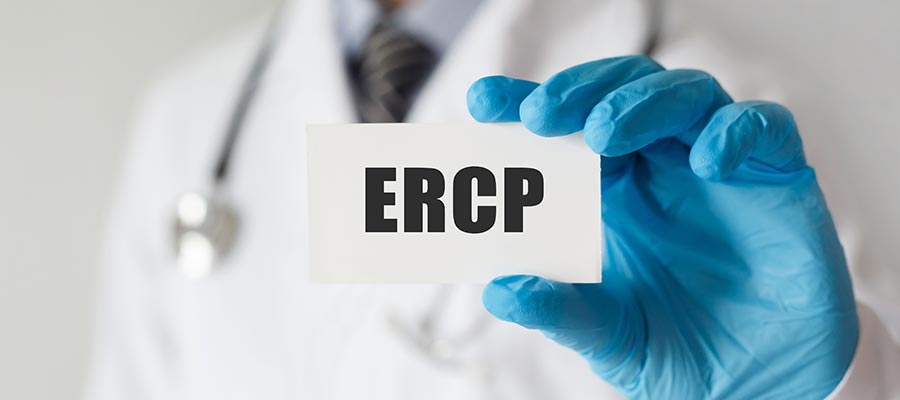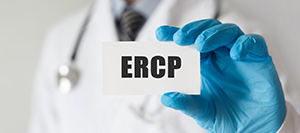Endoscopic Retrograde Cholangiopancreatography (ERCP) Procedure Q&A
At Digestive Disease Care (DDC), our board-certified gastroenterologists specialize in Endoscopic Retrograde Cholangiopancreatography (ERCP) to diagnose and treat bile duct and pancreatic conditions. Using advanced technology, we ensure precise and effective care. Trust DDC for expert ERCP procedures and comprehensive digestive health management. For more information, contact us or book an appointment online. We have convenient locations to serve you in Babylon NY, East Setauket NY, Forest Hills NY, Jericho NY, Lake Success NY, Melville NY, Mineola NY, Massapequa NY, New Hyde Park NY and Riverhead NY.


Table of Contents:
What is the Endoscopic Retrograde Cholangiopancreatography (ERCP) procedure?
Why is Endoscopic Retrograde Cholangiopancreatography (ERCP) performed?
How many hours is an Endoscopic Retrograde Cholangiopancreatography (ERCP) procedure?
How long does it take to recover from an Endoscopic Retrograde Cholangiopancreatography (ERCP)?
At Digestive Disease Care, we offer a specialized medical procedure known as Endoscopic Retrograde Cholangiopancreatography or ERCP. This cutting-edge procedure combines upper gastrointestinal endoscopy and X-rays to diagnose and treat many conditions affecting the bile and pancreatic ducts and the gallbladder.
Our experienced team of physicians uses ERCP to diagnose and treat conditions such as gallstones, narrowing or blockages in the bile or pancreatic ducts, pancreatitis, and cancer of the biliary or pancreatic ducts. The procedure is carried out using a long, flexible endoscope which is carefully guided through the digestive tract, allowing our physicians to visualize the duodenum and the openings of the bile and pancreatic ducts.
We aim to provide the most comprehensive care possible. If any issues are detected during the ERCP procedure, our team is prepared to address them immediately. This immediate response can save our patients valuable time and prevent the need for additional procedures.
We recognize that any medical procedure can be intimidating, and our experienced team is committed to ensuring our patients’ utmost comfort. While ERCP is a minimally invasive procedure, we are upfront about the potential risks, which can include infection, pancreatitis, bleeding, perforation of the digestive tract, and allergic reactions. However, these risks are relatively low, and ERCP is widely considered safe and effective.
Following the procedure, patients may experience some temporary discomfort such as bloating, nausea, or a sore throat.
Endoscopic Retrograde Cholangiopancreatography (ERCP) allows us to diagnose and treat conditions impacting the bile ducts, pancreatic duct, gallbladder, and their ductal systems. ERCP is a vital tool, often used for diagnosing and treating conditions of the bile ducts including gallstones, inflammatory strictures (scars), leaks resulting from trauma and surgery, and cancer. If gallstones are suspected, we employ ERCP to locate and remove or break the stones.
We also utilize ERCP in the management of pancreatitis, a condition characterized by inflammation of the pancreas. By inserting a stent into the pancreatic duct, our physicians can drain fluid and relieve pressure to alleviate pain and inflammation. ERCP is further instrumental in diagnosing and staging pancreatic and bile duct cancers by enabling the procurement of tissue samples for biopsy.
In addition, we use ERCP to drain pancreatic pseudocysts, fluid-filled sacs that can form in the pancreas, reducing the risk of complications. The procedure is also useful in managing cholangitis, an infection of the bile ducts, as it allows the physician to clear any obstructions and administer antibiotics directly into the biliary system.
Lastly, we employ ERCP to extract samples of tissue or fluid for further testing in a lab, which can be beneficial in diagnosing a variety of conditions, including cancer.
ERCP is a specialized procedure that can take anywhere from one to two hours, depending on the patient’s specific condition, anatomy, and any unforeseen circumstances that may occur during the procedure. Our team ensures the utmost care and patient safety during this time.
Before the procedure, patients are required to fast for several hours so that the stomach is empty, thereby allowing for better visualization. We also provide sedation to ensure comfort throughout the process.
Our doctors, using an endoscope, will navigate through the esophagus, stomach, and into the duodenum to locate the opening of the bile duct and pancreatic duct. This endoscope, which is a thin, flexible tube with a camera at the end, allows our doctors to accurately identify the necessary ducts. A small catheter is subsequently inserted through the endoscope into these ducts.
To obtain a clear visualization of the ducts on an X-ray, a contrast medium is administered via the catheter. This enables our physicians to evaluate the ducts for any irregularities, such as obstructions or constrictions. They may also execute supplementary procedures, such as extracting gallstones or implanting stents to alleviate ductal blockages.
Post-procedure, we monitor the patient closely to ensure there are no complications. Although patients may experience some discomfort or bloating, it usually resolves within a few hours. We also recommend factoring in additional time for preparation before the procedure and recovery time afterward.
The recovery period after ERCP varies among individuals due to factors such as health status and the complexity of the procedure.
Immediate Recovery
Post-ERCP, our patients begin their recuperation in a monitored environment to check for immediate complications like infection or severe pain. This monitoring phase lasts for one or two hours after which patients can go home to continue recovery. Patients may feel groggy or light-headed due to sedatives used during the procedure. It is advisable to have a companion during this time. Mild discomfort such as a sore throat, nausea, abdominal bloating, or gas is also common.
Full Recovery
We find that most patients resume their regular activities within a day post-ERCP. However, full recovery could range from a few days to several weeks, depending on the procedure and the patient’s response. We suggest refraining from strenuous activity or heavy lifting for at least a week following the procedure. A low-fat, high-fiber diet can facilitate recovery.
Complications and Extended Recovery
Rarely, some patients may experience complications such as bleeding, infection, pancreatitis, or perforation of the bile duct or pancreas, which can extend the recovery period. If symptoms like abdominal discomfort, bloating, and nausea persist or increase, or in case of severe abdominal pain, fever, or jaundice, it is critical to seek immediate medical attention.
Our team at Digestive Disease Care is committed to ensuring a smooth and successful recovery post-ERCP. Remember, each patient is unique, and recovery times can vary. Hence, it’s crucial to adhere to the specific recovery guidelines provided by our healthcare providers. Schedule your consultation today and embark on a path to better health and well-being. We have convenient locations to serve you in Melville NY, New Hyde Park NY, Forest Hills NY, Jericho NY, Mineola NY, Lake Success NY, Babylon NY, East Setauket NY, Massapequa NY, Riverhead NY and BEYOND.

Check Out Our 5 Star Reviews


Additional Services You May Like

Additional Services You May Like
- Abdominal Pain
- Acid Reflux
- Barretts Esophagus
- Bloating
- Capsule Endoscopy
- Celiac Disease
- Colon Cancer Screening
- Colonoscopy
- Constipation
- Crohns Disease
- Diarrhea
- Diverticulitis
- Esophageal PH Monitoring
- Fatty Liver
- Fibroscan
- Gallstones
- Gastroenterologist
- Gastric Chest Pain
- Gluten Intolerance
- Hemorrhoid
- Hemorrhoid Banding
- Hepatitis
- Irritable Bowel Syndrome
- Lactose Intolerance
- Pancreatitis
- Polyps
- Rectal Bleeding
- Stomach
- Ulcerative Colitis
- GI Urgent Care





